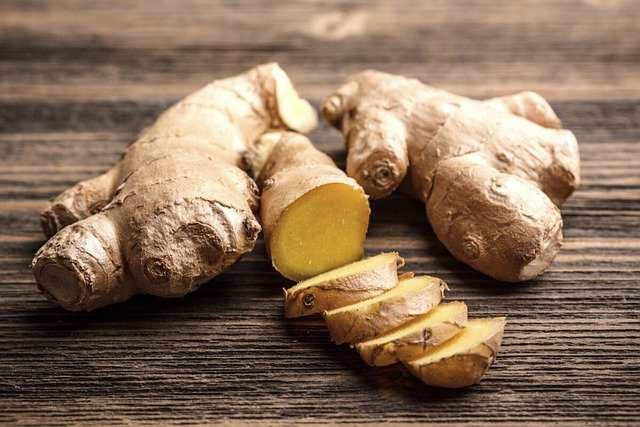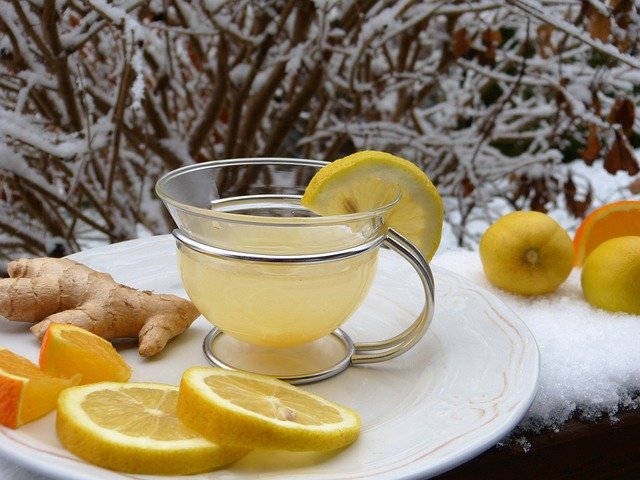Ginger: Zingiber officinale, Zingiberis Rhizoma (Radix, Zingiberis, Rhozome Zingiberis)
Planet: mars
Known to be: warm and dry
Collect/Harvest: october, november
Used parts: Rhizoma
Family: Zingiberaceae (ginger family)
Origin: China, India, Australia, Jamaika
Main active components: essential oil, resin
Essential complex oil, (2,5-3% Sesquiterpenes, such as Zingiberen, ar-Curcume …. Monoterpenes, such as Campher, often sharp Arylalkanes, such as Gingerole.
Oleum zingiberis: ginger oil, produced through water destillation, from dried radix (roots). Used mainly for drinks, sweets and perfumes.
Main use: For blood circulation, and digestion.
Ginger is said to raise chi (life energy), and enhance mental concentration. Ginger has been associated with dragons 🙂 because of their fiery breath and feisty nature.
As a warm and dry plant, Ginger has been used to warm the body. It follows that it is a great plant for low blood pressure, colds, or nausea and dizziness.
Ginger is mainly used as a spice, but also toinc for the stomach, and digestion. It is often recommended for nausea. In Asia, used in traditional medicine also for migraines.
Ginger was used in India and China since ancient times and widely used as a spice. Old chinese medicinal books and also sanskrit writings mention the drug very early on.

Application of Ginger:
You will find Ginger in many tea compositions, sweets, in the spice section of stores, in various forms in the pharmacy and herb store or natural health store, and in form of the natural root in supermarkets or vegetable markets for cooking. It is used in many Asian dishes, and teas.
In India, for example, hot lemon and ginger (tea) is used as soon as there is a hint of a cold or throat infection. Pour boiling water over 2 – 3 thumbsized slices of freshly cut ginger (cut from the root) in a cup, let steep for 10 minutes, add freshly pressed lemon juice to your liking (1 tablespoon – 3 tablespoons, or half a lemon). If you don’t have fresh ginger root at hand, you can use 1 teaspoon of dried, grounded ginger instead.

Ginger belongs to popular emmenagogues (promote the onset of menstruation): put 1 teaspoon powdered ginger into a cup, and pour boiling water over it. Or make tea of 30 g whole dried ginger, or fresh grounded in 1 l water. Do not drink more than 4 cups (1 l) a day.
Stomach Ulcers: tincture, 3 times / day, 20 drops.
Ginger pulverised for travel: max. 250 mg.
Ginger is one of the mysterious plants that bring us to the wonderous balancing workings of nature: it is an important plant for women’s health – it is used as well for bringing the menstruation to flow, for example when late, but it is also used for morning sickness. Therefore, don’t overdo it. It is also said that when you take ginger for a week when your period is late, but nothing happens, but you feel sick instead – it might be a sign that you are pregnant.
Ginger again plays a role in birth, when it is time, it is said that it can help to promote birth.
Disclaimer
This article constitutes no health advice: This is a short overview for educational purposes only. Information given is for your entertainment, to describe, how ginger was used in traditional medicine. Do not self medicate. Consult your doctor before using ginger or any other plant for health reasons, especially when pregnant or wanting to become pregnant and when giving birth. Uses described above are based on folklore experience medicine, i. e. accounts of people based on their own personal experience and on the experience of herbalists. Current scientific basis for that or studies have not been checked for this educational article.

